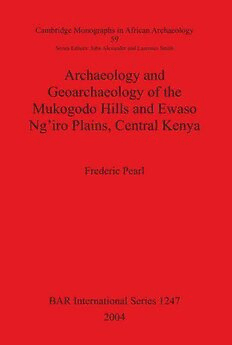
Archaeology and Geoarchaeology of the Mukogodo Hills and Ewaso Ng'iro Plains, Central Kenya PDF
81 Pages·2004·5 MB·English
Most books are stored in the elastic cloud where traffic is expensive. For this reason, we have a limit on daily download.
Preview Archaeology and Geoarchaeology of the Mukogodo Hills and Ewaso Ng'iro Plains, Central Kenya
Description:
Since 1996, the author has been involved with a cultural, archaeological, and geological survey of the Mukogodo Hills and Ewaso Ng'iro Plains in Central Kenya. Results of this research are presented herein, with a primary goal of providing an environmental chronology and describing patterns of human land use through the Late Pleistocene. This was accomplished through geoarchaeological and archaeological survey. The geoarchaeological study demonstrates how local environmental conditions, particularly fluvial geomorphology, have responded to East African climatic fluctuations. This, in turn, provides a comparative basis to interpret cultural change documented by the archaeological survey. While building on research that has already been conducted in the region, these investigations provide the context within which to make archaeological interpretations meaningful. This research addresses four main questions. First, did landscape changes affect the distribution of archaeological sites in the Mukogodo Hills-Ewaso Ng'iro Plains region? Second, are there significant differences in land-use patterns between the Middle and Later Stone Age inhabitants of the region? Third, did the arrival of pastoralism contribute to erosion and degradation of the landscape? Fourth, has ecological change correlated with changes in economic patterns observed in the archaeological record?
See more
The list of books you might like
Most books are stored in the elastic cloud where traffic is expensive. For this reason, we have a limit on daily download.
